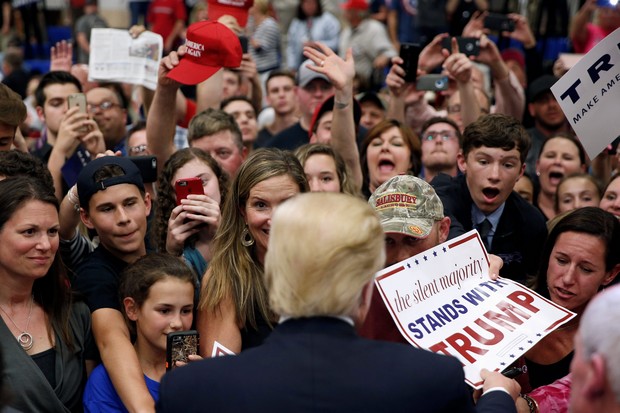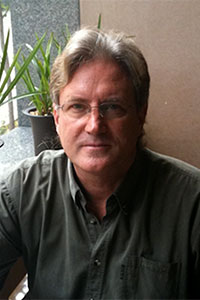
Perhaps the most troubling aspect of a Donald Trump presidency is not the man's big-headed, pig-headed penchant for self-promotion, but the shock wave of hate he has awakened. Americans are stressed and politically distressed, expressing anger in vulgar, bipolar ways.
I observed the current electoral cycle from Ithaca, New York, a university town that voted 85% for Hillary Clinton, with a smattering of votes for independent Jill Stein and others. But the familiarity of one's immediate environs can be deceiving, for one only has to drive a few minutes out of this liberal community and then it's conservative country for hundreds of miles in every direction.
People on this little blue islet in a big red sea are worried the political waves to come. Already there was a "cry-in" on campus and a mourning vigil on the downtown commons. Local cafes played comfort music, mostly 1960s rock and folk ballads such as This Land is Your Land while doling out extra servings of comfort food. I was in the public library on the day after the US election looking for books on the history of fascism when an old white-haired woman came up to me, expressing fears about the future. She showed me an illustration of the planet earth perched on the edge of a sharp precipice.
"That's how I feel now," she explained.
"You mean, like, earth in the balance?"
"No. Like the end of the world... I am Jewish, 100%. My mother was a victim. The racial hatred. You know, the swastika."
The upswing of swastika taunts in the wake of Mr Trump's victory is odd and troubling, but not symptomatic. Some Trump supporters are indeed unrepentant chauvinists and xenophobes, but he did better than his "respectable" Republican predecessor Mitt Romney with minorities, and better than Hillary Clinton with women in key states.
Indeed, one of the few Trump supporters I met in Ithaca was an African-American magician who does magic tricks on the commons. When I saw his folding table decked out in support of the great white hope, I took it to be a put-on, part of his show, something he would make disappear -- presto! But he turned out to be utterly serious in conversation. I later saw him on local access TV promoting Mr Trump.
Ithaca's hip reputation of being "centrally isolated" is a geographic fact of life, for it sits squarely in the middle of upstate dairy country, far off the grid of interstate highways and train lines. What I didn't realise at first was the acute political isolation.
"Liberal" Ithaca is the rare exception to the area pattern of job decimation and failing farms, an enclave where real estate values rise and jobs are created. Being home to Cornell University and Ithaca College alone can explain the difference, but it is also a beneficiary of ecotourism, the organic food boom and it serves as a hub for outlying hamlets.
The weathered church steeples, abandoned workshops and struggling brick and mortar shops bring to mind Main Street, USA. Not the Disney-lite version, but the heavy Hollywood one. If you've seen Jimmy Stewart's hometown in It's a Wonderful Life, (a composite of nearby Montour Falls and Ithaca) you can picture what it looks like. Or used to look like. Things have gone downhill to the point that the dystopian decay of Back to the Future is real.
Rednecks are among Mr Trump's most fervid supporters, but so are humble farmers, army veterans and evangelistic Christians. The five-hour drive from Ithaca to New York City takes one through little Trumpvilles dominated by derelict downtowns. With so many impoverished hamlets in the agro-industrial rust belt, it's not for nothing that even locals refer to the border along Pennsylvania as "Forlornia".
But to dismiss the blue-collar workers and rednecks that race around the backcountry in pickup trucks as white trash (or "deplorables" as Hillary put it) was a miscalculation of her campaign. Having lived subsistence style in the shadows so long, the rabblement's anti-establishment hatred was palpable when offered a chance to show how they felt at the polls.
So how did a spoiled, flamboyant, carrot-top kid from Queens turned real estate mogul come to be the spokesmen for rural values? How did this jet-setting playboy Manhattan-dwelling snob get the stamp of approval from bible-thumping rural folk?
Mr Trump succeeded with "deplorables" because he paid attention to them.
As much as "The Donald" might like to hear himself talk, he paused long enough to hear their pain. He jetted into impoverished towns and winged it, speaking off the cuff in populist lingo, dropping the pretence of civility to emote in stark terms that struck a chord.
The Democrats, clinging to President Barack Obama's urbane urban strategy, foisted the tired Clinton dynasty on a rust-belt nation in the midst of a paradigm shift, and stumbled badly. With Bernie Sanders as the agent of change, they might have had a chance. With Ms Clinton, it was too much of the same old, same old at a time when it should be evident that nothing will ever be the same again.
Given the vulgar rhetoric that ravaged all sense of decency during the campaign, fears of creeping fascism are not without foundation.
For better or worse, a deeply divided US is on the cusp of change, and the whole world watching with bated breath.
Philip J Cunningham is a media researcher covering Asian politics.
